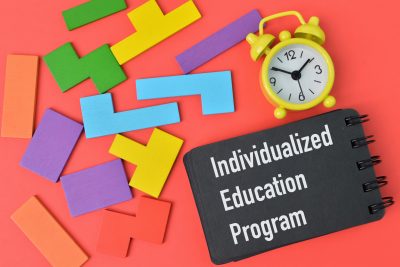A Brief Overview A first-time IEP document is a lot to absorb. This article provides tips to help family members read through a draft IEP and prepare to participate on the IEP team that finalizes the Individualized Education Program before services begin. Remember, the school’s first version is a DRAFT, and family members of the Read More
A Brief Overview Full Article Behavior is a form of communication, and children often try to express their needs and wants more through behavior than words. When a young person has a disability or has experienced trauma or other distress, adults and authorities may need to put in extra effort to understand. Missed cues and Read More
A Brief Overview Full Article Summer provides an opportunity to reset for the school year ahead. If your child has a disability, you may want to think about what went well or what could have gone better last year. By getting organized, you can plan ahead for fall and beyond. This article includes resources and Read More
A Brief Overview Alarming statistics indicate the pandemic worsened many behavioral health outcomes for young people. Governor Jay Inslee on March 14, 2021, issued an emergency proclamation declaring children’s mental health to be in crisis. President Joe Biden issued a Fact Sheet about the nation’s mental health crisis on March 1, 2022, as part of his State Read More
A Brief Overview When a family chooses to enroll their student with disabilities in a private school, they have different rights. Those rights are summarized in this article and further explained by U.S. Department of Education guidance issued in February 2022. School districts are responsible to seek out and evaluate all students suspected of having disabilities Read More
ADA: Americans with Disabilities Act. Prohibits discrimination against individuals with disabilities in all public and private places open to the general public. Adult Services: Programs available to support individuals after they become legal adults at 18. Age of Majority: In Washington, 18. An adult is responsible for educational, vocational, financial, and other decisions unless other Read More
When a student’s behavior gets in the way of their learning and/or the learning of others, the school is responsible to figure out how to support behavioral expectations. One way to do that is to assess why the student might be acting out and use that information to consider how positive behavioral interventions might teach Read More
Why Get Help from PTI? Parent Training and Information (PTI) is federally funded to support family caregivers, youth, and professionals. We know educational systems use a lot of complicated words and follow procedures that can feel confusing. We do our best to provide tips for communicating as members of a school-and-family team that develops a student’s Read More
A Brief Overview The Adolescent Behavioral Health Care Access Act, passed into law by the Washington Legislature in 2019, gives parents and providers more leverage in treating a young person who will not or cannot independently seek medical help for a behavioral health condition. The Washington State Health Care Authority (HCA) hosts website links with information about Read More
A Brief Overview Schools are required to accommodate parents to ensure their attendance and participation at meetings where their child’s special education services are discussed. Those rights are affirmed in a court decision from 2013: Doug C. Versus Hawaii. A meeting that includes family is a higher priority than a renewal deadline. If a deadline Read More
Asking for something you want or need for yourself or someone you love can take courage and inner strength. The ask is easier when you have basic advocacy tools. This short video provides a two-step process to help advocates step into their role with more confidence. Here are the words that go with the video: Read More
Under state and federal law, all parents have the right to information about their child’s education in a language they can understand. This information is translated on handouts in multiple languages from the Office of Superintendent of Public Instruction (OSPI). Language access includes translated documents and an interpreter for meetings and conversations. Parents have the Read More
Some people infected by the SARS-CoV-2 virus experience long-term symptoms—called Long COVID. If lasting symptoms significantly impact a person’s life, their ability to work, or their access to school, disability laws are in place to protect and support them. Among federal laws that support disability rights are the Americans with Disabilities Act (ADA), the Rehabilitation Read More
As schools open for the 2021-22 school year, families have decisions to make about health and safety. This article provides information and resources to address some key questions: What measures are schools required to take to keep children and staff safe? What COVID precautions should our family consider? What should we do if returning to Read More
A Brief Overview Early intervention services help infants and toddlers with disabilities or delays to learn and catch up in their development. This article covers some basics about services for young children in Washington State. Families concerned about a child’s development can call the Family Health Hotline at 1-800-322-2588, with support in multiple languages. Parents can Read More

